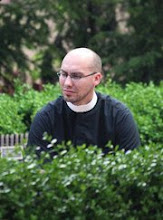Benedict's Apostolic Pilgrimage - part 1

In light of the Holy Father's visit to America, I have been watching EWTN for commentary about the pilgimage. I wanted to reflect on some of my observations in this series.
The first quote is not directly related to the visit, but I heard it while trying to follow the visit -
Fr. John Corapi was talking about a conversation he had with a woman who converted to Roman Catholicism. She told him, "You really convinced me, because you are so convinced yourself." He relayed that to his audience and then said - and this is the interesting part - "It is true. I am convinced. I believe everything the Church teaches. I may not understand it all. I may not be able to explain it all. But I believe it all."
There are several interesting things about this notion of believing everything the church teaches. I wonder how many Nazarene pastors would say the same thing? I talk with pastors all the time who say things like, "I know the style="font-style:italic;">Manual style="font-style:italic;"> says [fill in the blank] but I think [fill in the blank]. I find it oddly refreshing that someone believes everything their church teaches. I wish the same could be said for us instead of the continual infighting over Wesleyan Holiness vs. American Holiness; baptism vs. dedication; Real Presence vs. Memorial, etc, etc, etc.
It also points to what I believe is one of the The Church of the Nazarenes greatest failings. Many will disagree with me, citing Bresee, or Wesley, or Augustine or whoever really said it, "in essentials unity, in non-essential liberty, in all thing charity." That is a lovely quote, but it just doesn't work. Never did. Never will. Why? Who says what is essential? For me sacraments are essential: one can no more be holy as God is holy while ignoring the sacraments as she can while ignoring the 10 commandments. As long as there is no clear understanding of essentails, the quote fails.
The church must step up and clearly teach what it believes. No wishy-washy-ness. No having it both ways. No muddled doctrinal statements trying be pacifying rather than clarifying. When we cannot clearly articulate what the Church believes about [fill in the blank], we are doing ourselves and the world a great disservice.
Further, his statement is a faith statement. It is a faith statement in the Church. It demands a high respect for and understanding of the Church, one which is sorely lacking in most evangelical circles. The Church is not just wherever two or three are gathered in His name. The church is not just an organiation. The church the body of Christ. It is Christ's continuing presence in the world. Most evangelicals I know would not care if a person believed everything the church taught because it really doesn't matter. All that matters is what the Bible says, and how I interpret and believe what the Bible says. The church somehow gets left out of the mix, perhaps by its own retreat from the conversation.
If we believe the church is just wherever 2 or 3 are gathered then it is ok that we all believe whatever we want. If the church is just an organization it is ok that we are all able to believe what we want within the confines of the organization. But it if the Church is the body of Christ - Christ continuing, physical, mystical presence in the world then we must be much more careful to be the church. To believe what the church teaches.
Perhaps this will be a little more clear after the next observation which is directly related to the nature of the Church. For now though, help me unpack this wonderful faith statement:
"I believe everything the church teaches. I do not understand it all. I cannot explain it all. But I believe it all."


